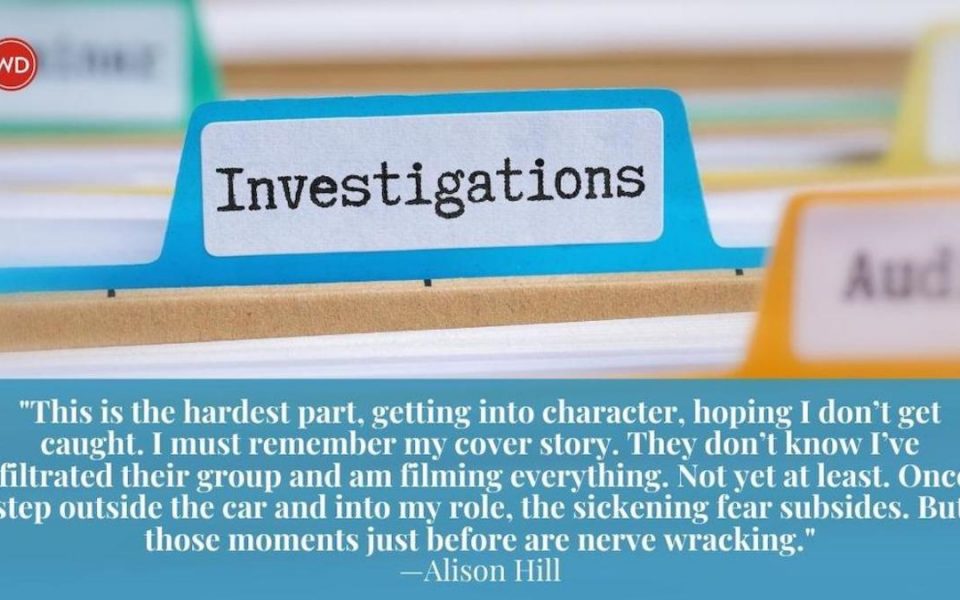What Is Investigative Journalism?
My heart pounds as I prepare to enter the building. A backpack, equipped with a hidden camera occupies the passenger seat, an entity all its own. This is the hardest part, getting into character, hoping I don’t get caught. I must remember my cover story. They don’t know I’ve infiltrated their group and am filming everything. Not yet at least. Once I step outside the car and into my role, the sickening fear subsides. But those moments just before are nerve wracking.
(How Not to Write a How-To Book)
This was my most memorable assignment as a television investigative journalist—going undercover for five weeks with an alleged cult. The job wasn’t always so dramatic of course, most days involved in-depth research. Which, in a nutshell, answers the question: What is investigative journalism?
But let’s dig further into this definition.
Journalism falls into four broad types: news journalism, feature journalism, opinion/analysis, and investigative journalism. Investigative journalism goes beyond reporting the ‘who, where, how, what, when, and why,’ which works for most news stories and features. It is fundamentally all about the intensity and thoroughness of the research and the time allotted to conduct it, hence the word investigative. This separates it from other forms of deadline-driven news journalism. The types of stories also differ, involving “bigger,” more complex issues and components, which we’ll get into shortly. It’s a deeper dive into a story and the uncovering of something previously unknown or deliberately hidden. Additionally, the journalist has the time and resources to find the information and plough through all the evidence needed to substantiate the story, making it worthy of broadcast or publication.
If you search the term “investigative journalism” online, you’ll find a general description such as: the uncovering of corruption, fraud, and crime, often in politics and business. But it encompasses so much more. A journalist can investigate just about anything if it’s a good story, if something untoward is going on in any institution or group, or citizens experiencing wrongdoing or injustice.
A typical day as an investigative journalist involves phone calls, poring over documents and sifting through data, analyzing information and thorough fact-checking. Additionally, for me it would be meeting up with contacts, building a relationship of trust with the main source, filming interviews and logging tapes. I would work on one story for as long as it took to gather information and make a “case.” Often, they wouldn’t pan out after some initial research, usually due to lack of evidence or sources unwilling to talk on record.
David E. Kaplan, Executive Director of The Global Investigative Journalism Network, describes investigative journalism on the organization’s website as the “in-depth, systematic use of original research and reporting. It often uses large amounts of data and documents. It uses public records to find out what is going on.” Kaplan explains that according to veteran trainers in the field, the best investigative journalism “employs a careful methodology, with heavy reliance on primary sources, forming and testing a hypothesis, and rigorous fact-checking.”
As to what investigative journalism achieves—it shines a light on something unacceptable, that was previously hidden or kept secret. It exposes corruption, big or small, or a danger to the public or workforce that’s been covered-up, and it holds leaders accountable.
Some of the most famous modern investigative stories are the Watergate scandal first published in The Washington Post in 1972, and more recently in 2017, The New York Times exposé of Harvey Weinstein. Both these investigations caused sweeping changes in our society, which is another element of investigative journalism—the motivation behind the stories, to bring about change and improve a situation. As Kaplan states, investigative journalism often involves the “unearthing of secrets” and “has a strong emphasis on social justice and accountability.”
Historically, activism has been an integral part of investigative journalism. Black journalist Ida B. Wells was using investigative skills in her reporting long before they were common, revolutionizing the “power of the pen” and uncovering the truth about lynchings in the late 1800s. The New York Times stated in an obituary that Wells “pioneered reporting techniques that remain central tenets of modern journalism.”
So, what does it take to become a good investigative journalist? It involves digging for information and using primary sources, be it records or people. It requires excellent communication skills—asking tough questions, probing, and listening to people’s stories. You need keen observation skills, instinct, and discernment. Do you think the storyteller is sincere? It requires patience, following up on leads, careful analysis, checking facts, following data trails, and talking with lawyers. And to reiterate—it takes time. Some stories require weeks, months, or sometimes years to investigate.
Investigative journalism doesn’t always produce worldwide attention-grabbing headlines; often they’re more localized stories, but are equally important.
I spent a year investigating the dangers of low-flying military jets in Wales. A headmistress suspected her school was being used as a practice target, endangering students’ lives. To test the hypothesis, we trained the kids to use a video camera and methodically record the frequency of jets whizzing 100 feet over their classroom, and the results were significant. Further research uncovered near-misses involving police helicopters and civilian pilots. We also interviewed a man who described an F1-11 crashing in the field behind their farmhouse. These additional cases broadened the scope and strengthened the story. The British Ministry of Defence (unsurprisingly) refused our invitation to offer “their side” of the story.
While traditional media outlets have suffered massive budget cuts and funding loss for investigative journalism, technology has opened doors for a new generation of documentarians and citizen journalists. With camera phones, go-fund me campaigns, and digital access to data, those with the skills and passion for finding the truth have options. Whether this work is reliable and/or reputable is open to debate. Although this type of “reporting” does not conform to the same rigorous standards and accountability demanded of traditional investigative journalism, it’s here to stay and growing.
There is now an abundance of excellent documentaries which many argue already come under the umbrella of investigative journalism, although some are heavily one-sided. And there are independent investigative journalism outlets sprouting all over the internet, some more credible than others.
Are we seeing a new phase of investigative journalism? Will we have to redefine this branch of journalism soon?
Maybe. But in the meantime, our definition holds firm, keeping the investigative journalists among us accountable, believable, trustworthy, and allowed the freedom to excel in their profession, bringing us stories—big or small—that would otherwise never see the light of day. Stories that could change the world.
Resources
https://gijn.org/about/investigative-journalism-defining-the-craft/
https://www.cima.ned.org/resource/global-investigative-journalism-strategies-for-support/
https://www.usatoday.com/story/money/shopping/2022/01/12/ida-b-wells-barbie-doll/9186016002/
https://www.pulitzer.org/prize-winners-by-category/206
https://www.thebureauinvestigates.com
https://www.guilford.com/books/The-Journalism-of-Outrage/Protess-Cook-Doppelt-Ettema/9780898625912

When you take Freelance Writing for Stay-At-Home Moms, you’ll read Writer Mama by Christina Katz and discover what your areas of expertise are, who you want to write for (your audience), how to network with other freelance writers and stay-at-home moms, and practical advice for developing your career as a freelance writer.


